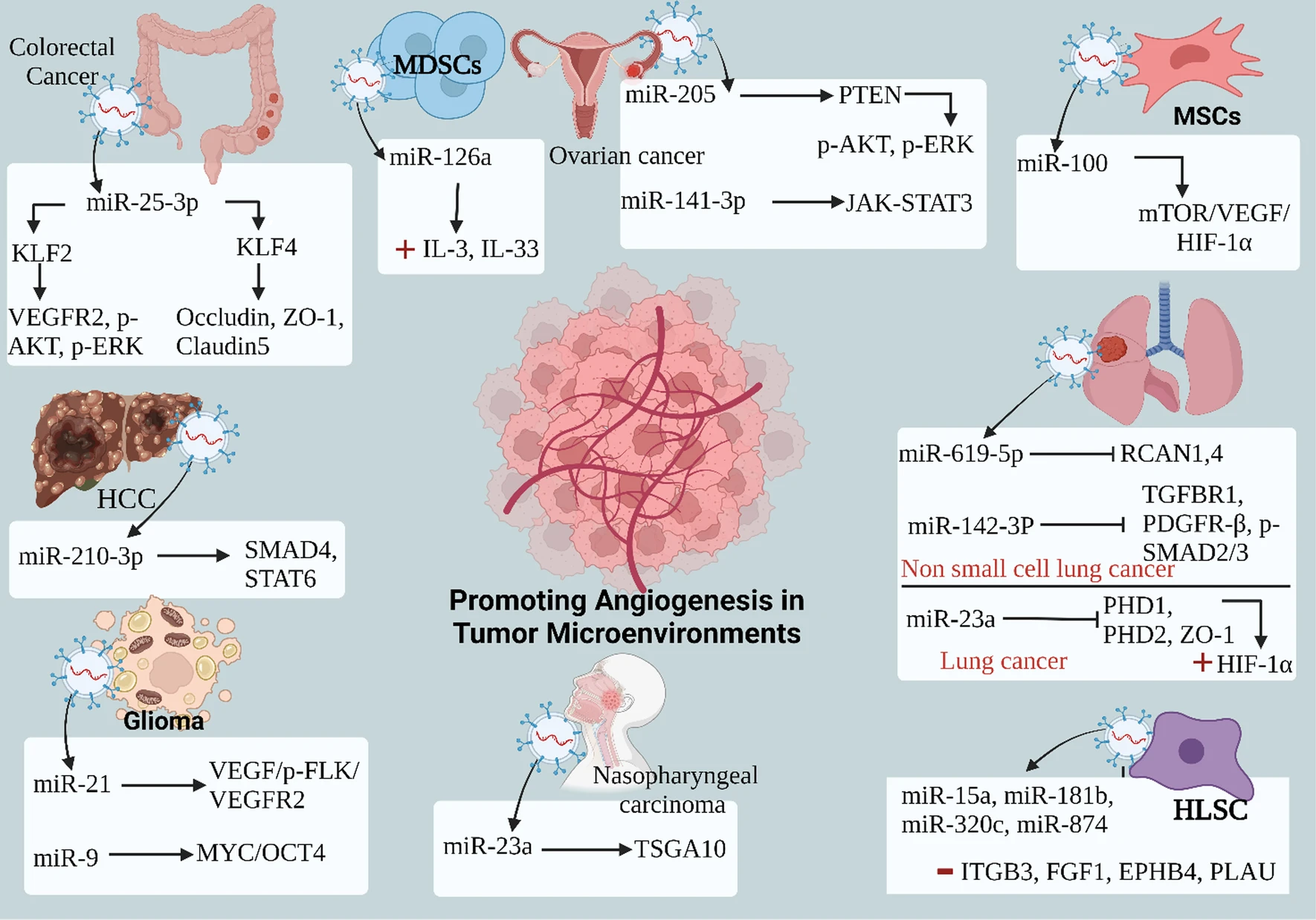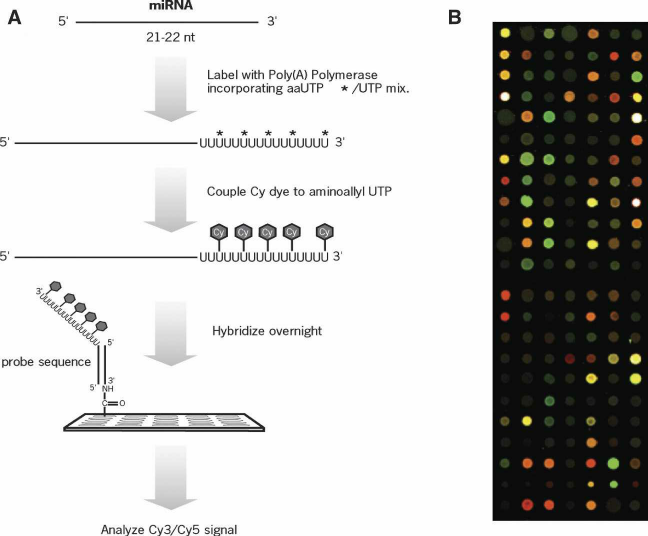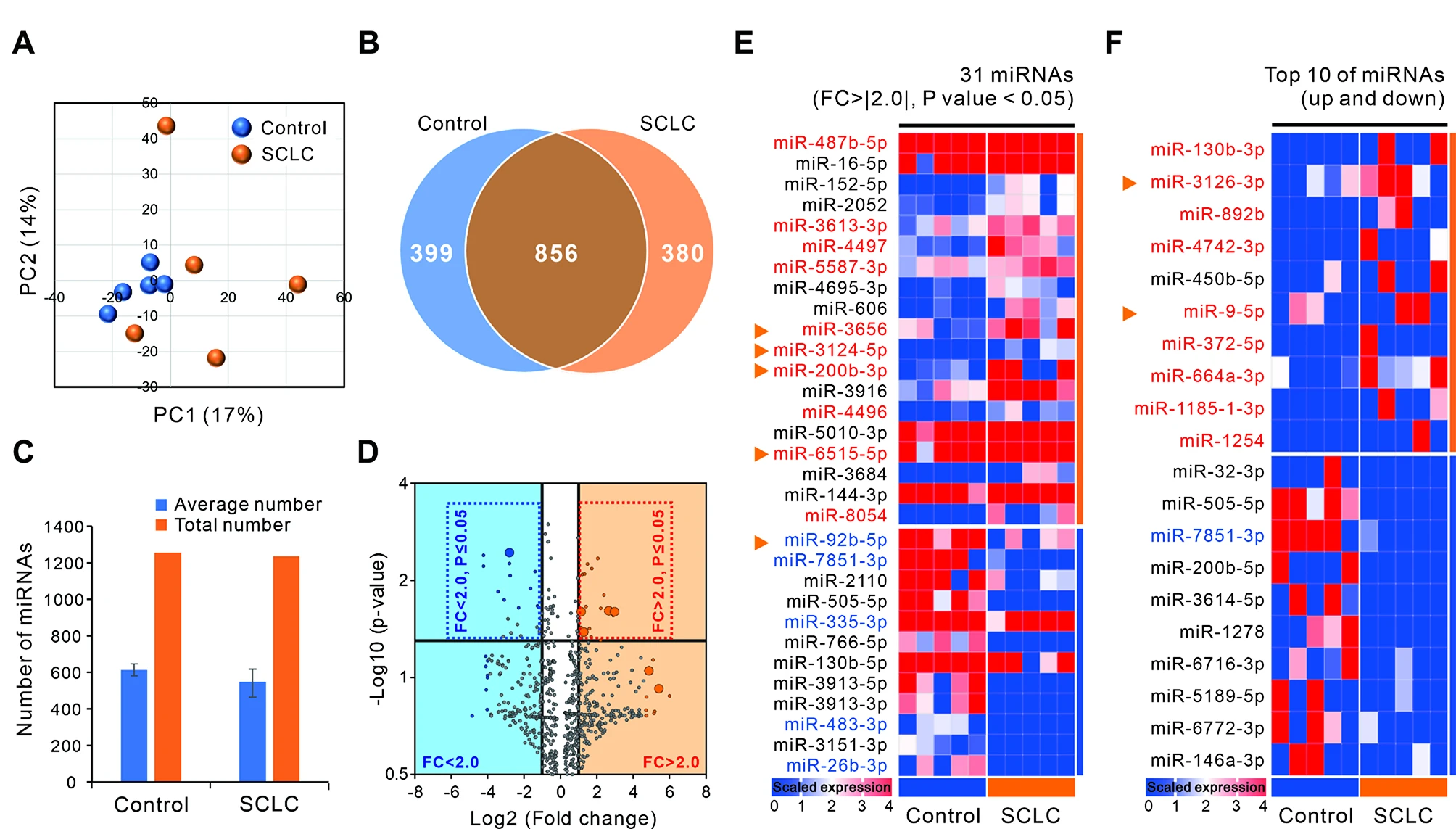Exosomal miRNA Microarray Service
- Identify cancer-specific exosomal miRNA biomarkers (e.g., for lung, breast, gastric, and liver cancers).
- Assess disease progression, treatment response, and recurrence risk.
- Identify miRNA regulatory networks associated with diseases to discover novel therapeutic targets.
- Support mechanistic validation of miRNA during new drug development.
- Reveal the roles of exosomal miRNAs in cell communication, metastasis, and drug resistance.
- Analyze key signaling pathways influenced by miRNAs.
- Promote liquid biopsy technology development, supporting precision medicine.
- Enable personalized treatment strategies, such as monitoring therapeutic response based on exosomal miRNA profiles.
Exosomes are nanoscale membrane vesicles secreted by various cells into body fluids through exocytosis, typically ranging from 30 to 150 nm in diameter, and are widely present in blood, saliva, urine, and other body fluids. In recent years, exosomes have become crucial subjects of research in cell-to-cell communication, disease development, and therapeutic target discovery, as they carry abundant biological molecules such as miRNAs, mRNAs, proteins, and lipids. Among them, exosomal microRNAs (miRNAs), a class of non-coding RNAs that regulate gene expression, play essential roles in cell proliferation, differentiation, apoptosis, and immune regulation, and hold significant potential as biomarkers for cancers, cardiovascular diseases, neurodegenerative disorders, and other major diseases.

Nail, H. M. et al. J Biomed Sci. 2023.
Figure1. Mechanisms of Exosomal miRNA Regulation of Angiogenesis in Tumor Microenvironments
However, due to the complex origin, nanoscale size, low abundance, and high heterogeneity of exosomal miRNAs, traditional detection techniques struggle to meet the demands for high-throughput and high-sensitivity analysis. Exosomal miRNA Microarray technology, with its precise probe capture system and highly sensitive signal detection, has become a powerful tool for systematically profiling exosomal miRNA expression, identifying disease biomarkers, and exploring molecular mechanisms.
As a global leader in comprehensive exosome research solutions, MtoZ Biolabs provides one-stop exosomal miRNA microarray service to help researchers efficiently and accurately obtain exosomal miRNA expression profiles, driving progress in early disease screening, target discovery, and mechanistic studies.
Technical Principle
Exosomal miRNA Microarray technology involves isolating exosomes from biological fluids such as plasma, serum, urine, and cerebrospinal fluid, followed by miRNA extraction from within these exosomes. Specific oligonucleotide probes complementary to known miRNA sequences are used for hybridization, and fluorescence signals are detected to quantify miRNA expression levels. The resulting data are then subjected to bioinformatics analysis and interpretation. This technology offers significant advantages, including high throughput, high sensitivity, minimal sample requirement, and broad applicability, making it especially suitable for disease biomarker discovery, differential expression analysis, and miRNA profiling.

Shingara, J. et al.RNA. 2005.
Figure2. Overview of the miRNA Microarray Procedure
Service at MtoZ Biolabs
MtoZ Biolabs is committed to providing comprehensive exosome omics analysis solutions for global research clients, covering exosome isolation, miRNA/mRNA/lncRNA sequencing, exosomal proteomics, lipidomics, and downstream mechanistic validation and bioinformatics analysis. Our one-stop Exosomal miRNA Microarray Service based on advanced microarray platforms, integrates exosome isolation and purification, miRNA extraction, chip hybridization, data analysis, and functional annotation into a streamlined workflow, enabling clients to systematically profile exosomal miRNA expression. This service is compatible with a wide range of sample types, including serum, plasma, urine, and cerebrospinal fluid, allowing for the precise identification of disease-associated miRNA biomarkers, elucidation of miRNA regulatory mechanisms, and supporting early disease screening, target discovery, personalized medicine, and mechanistic studies. MtoZ Biolabs empowers basic and translational research across fields such as cancer, neurology, immunology, and cardiovascular diseases, delivering efficient and high-quality solutions to accelerate scientific discovery.
Analysis Workflow
Leveraging internationally advanced platforms, MtoZ Biolabs provides comprehensive exosomal miRNA microarray service covering the entire process from sample preparation to data delivery, with standardized and transparent workflows to ensure high efficiency and quality at every step.
1. Exosome Isolation and Extraction
(1) Isolate high-purity exosomes from various sample types, including plasma, serum, urine, cerebrospinal fluid, and cell culture supernatants.
(2)Utilize ultracentrifugation, density gradient centrifugation, and other methods, combined with Nanoparticle Tracking Analysis (NTA), Transmission Electron Microscopy (TEM), and Western Blot to verify exosome purity and specific markers (e.g., CD9, CD63, CD81).
2. Exosomal miRNA Extraction
(1) Apply high-efficiency, low-loss miRNA extraction techniques.
(2) Conduct rigorous quality control for miRNA integrity, concentration, and purity to ensure accuracy in downstream experiments.
3. miRNA Labeling and Microarray Hybridization
(1) Perform fluorescent labeling of miRNA molecules.
(2) Use high-density human/mouse/other species miRNA arrays covering all known miRNA sequences.
Conduct high-specificity hybridization to ensure authentic detection signals and minimal background noise.
4. Microarray Scanning and Data Analysis
(1) Use high-sensitivity microarray scanners to detect fluorescent signals.
(2) Conduct data normalization, differential expression analysis, clustering analysis, volcano plots, and heatmaps.
(3) Deliver comprehensive bioinformatics reports, including GO and KEGG pathway enrichment analyses.
5. Report Delivery
Provide raw data, analytical reports, miRNA differential expression profiles, functional annotations, and result interpretation.
Applications
Exosomal miRNA Microarray Service known for its efficiency and accuracy, has been widely applied in various research fields:
1. Early Disease Diagnosis and Prognostic Evaluation
2. Targeted Drug Development
3. Mechanistic Studies and Pathway Analysis
4. Translational Medicine and Personalized Therapy
Why Choose MtoZ Biolabs?
✅ High-sensitivity and High-throughput Platform: Utilizing internationally advanced microarray platforms and high-resolution scanning technologies, covering all known miRNAs to ensure comprehensive and precise detection.
✅ Extensive Sample Type Support: Compatible with blood, urine, cerebrospinal fluid, cell culture supernatants, and more, meeting the needs of various disease research applications.
✅ Standardized Workflow: Strict protocols for exosome extraction, miRNA isolation, and hybridization, with a professional team overseeing the entire process.
✅ One-stop Service: Seamless end-to-end service from sample to data, report, and scientific support, ensuring efficient research progression.
✅ In-depth Bioinformatics Analysis: A dedicated analysis team offering standardized and customized data mining, target screening, and pathway annotation.
✅ One-Time-Charge: Our pricing is transparent, with no hidden fees or additional costs.
Case Study
Small Cell Lung Cancer (SCLC) is a highly malignant and rapidly progressing type of lung cancer, lacking effective early diagnostic and prognostic tools. Exosomal miRNAs, owing to their stability and ability to reflect disease states, have emerged as ideal molecules for liquid biopsy applications. In this study, researchers extracted exosomes from plasma samples of SCLC patients and healthy controls, and employed miRNA microarray (miRNA array) technology to screen differentially expressed exosomal miRNAs. Subsequent qRT-PCR validation in independent cohorts confirmed a subset of candidate miRNAs. The results identified a miRNA panel composed of significantly dysregulated miRNAs, which could effectively distinguish SCLC patients from healthy individuals and demonstrated excellent diagnostic performance. Moreover, the expression levels of some miRNAs were strongly associated with patient survival times, highlighting their value for prognostic assessment.

Kim, D. H. et al. Biomark Res. 2023.
Figure3. Identification of miRNA Expression Profiles in Patients with SCLC
Ultimately, this study proposed a novel exosomal miRNA signature with significant potential for non-invasive early diagnosis and prognosis of SCLC, showcasing promising prospects for clinical translation.
FAQ
1. What is Exosomal miRNA Microarray Service? What research problems can it address?
A: The Exosomal miRNA Microarray Service is a high-throughput technology designed to profile exosomal miRNA expression. By using a specialized microarray platform, this service allows for the precise capture and quantification of miRNAs within exosomes, making it suitable for disease biomarker discovery, mechanism studies, and novel therapeutic target identification. This service effectively addresses the challenges of detecting low-abundance and heterogeneous exosomal miRNAs, helping researchers systematically explore miRNA regulatory mechanisms and uncover potential targets for early diagnosis and treatment, especially in areas such as cancer, cardiovascular diseases, and neurodegenerative disorders.
2. What are the advantages and differences between Exosomal miRNA Microarray and high-throughput sequencing (NGS)?
A: Both Exosomal miRNA Microarray and high-throughput sequencing (NGS) are important methods for analyzing exosomal miRNAs, but they differ in application and benefits. The microarray focuses on the efficient detection of known miRNAs, with advantages such as shorter turnaround time, lower cost, and mature protocols, making it ideal for large-scale sample screening, expression profiling, and biomarker discovery. In contrast, NGS is better suited for discovering novel or unknown miRNAs, offering greater coverage but also higher costs, more complex data, and longer analysis times. Therefore, for projects aiming to quickly and cost-effectively identify differential expression of known miRNAs, Exosomal miRNA Microarray is the preferred choice.
How to order?







